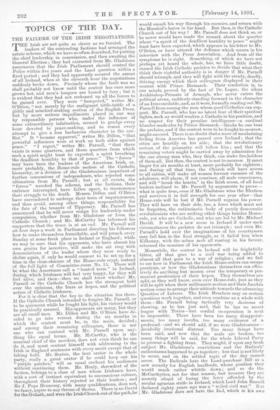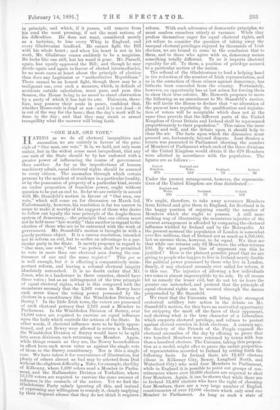TOPICS OF THE DAY.
•
THE FAILURE OF THE IRISH NEGOTIATIONS. THE Irish are not quite so clever as we fancied. The leaders of the contending factions had arranged the astute scheme, which we have so often described, for putting the chief leadership in commission, and then awaiting the General Election ; they had extracted from Mr. Gladstone assurances that the Irish Parliament should control the Police within five years and the Land question within a fixed period ; and they had apparently secured the assent of all Ireland, when at the eleventh hour the negotiations suddenly broke down. Precisely whose the fault was we shall probably not know until the contest has once more grown hot, and men's tongues are loosed by fury ; but it is evident that they had not reckoned up all the forces to be gained over. They were " hampered," writes Mr. O'Brien, " not merely by the malignant tittle-tattle of a giddy and mischief-making section of the English Press, but by more serious impediments placed in our way by responsible persons who, under the influence of some extraordinary infatuation, seemed to grudge every hour devoted to peace-making, and to resent every attempt to give a less barbarous character to the con- flict." It " became apparent," writes Mr. Dillon, " that powerful influences were at work on both sides against peace." " I regret," writes Mr. Parnell, " that there exists in some quarters, and those quarters from which such a spirit might least be expected, a spirit breathing the deadliest hostility to that of peace." The " forces " may have been the leaders of the American Irish, or, more probably, the Home-rule section of the Catholic hierarchy, or a division of the Gladstonians impatient of further concessions of independence, who rejected some ultimatum from Mr. Parnell ; but at all events, the " forces " wrecked the scheme, and the factions, their embrace interrupted, have fallen apart, to recommence their struggle to the death. Messrs. Dillon and O'Brien have surrendered to undergo their term of imprisonment, and thus avoid, among other things, responsibility for the fate of the tenants of Tipperary. Mr. Parnell has announced that he will never resign his leadership under compulsion, whether from Mr. Gladstone or from the Catholic Church ; and Mr. McCarthy has informed his supporters that the truce is at an end. Mr. Parnell will sit four days a week in Parliament directing his followers how to make themselves formidable, and will preach every Sunday at some fresh place in Ireland or England ; while we may be sure that his opponents, who have almost his own genius for invective, will make the air ring 'With denunciations of the leader whom they were ready to idolise again, if only he would consent to be set up for a time in the clear-obscure of the Home-rule crypt, instead of the full light of Committee-room No. 15. There will be what the Americans call a "heated term" in Ireland, during which Irishmen will feel very happy, for they will feel alive, and then—then we shall know whether Mr. Parnell or the Catholic Church has the strongest hold over the opinions, the fears or hopes, and the political action of Catholic Irishmen.
For it is clear that the key to the situation lies there. If the Catholic Church intended to forgive Mr. Parnell, or to be quiescent while he fought his fight, his victory would be practically assured. His opponents are many, but they are all small men. Mr. Dillon and Mr. O'Brien have de- cided to go into retreat during the six months in which the contest must be, in the main, decided ; and among their remaining colleagues, there is not one who can contend with Mr. Parnell upon any- thing like equal terms. Mr. McCarthy, who is the nominal chief of the seceders, does not even think he can do it, and must content himself with addressing to the Irish in England sentences with every merit except that of taking hold. Mr. Sexton, the best orator in the whole party, really a great orator if he could keep out his " purple patches," will as usual enchant his audiences without convincing them. Mr. Healy, shrewdest of the faction, belongs to a class of men whom Irishmen have, with a sort of instinct equivalent to unconscious culture, throughout their history rejected as their leaders ; and Sir J. Pope Hennessy, with many qualifications, does not, we fancy, aspire to any throne of thorns. There is no David for the Goliath, and were the Irish Church out of the path, he would smash his way through his enemies, and return with the Marshal's baton in his hand. But then, is the Catholic Church out of his way P Mr. Parnell does not think so, or he never would have made the remark about the quarter where "a spirit of the deadliest hostility to peace" might least have been expected, which appears in his letter to Mr. O'Brien, or have uttered the defiance which occurs in his interview with the Press Association. And from all the symptoms he is right. Something, of which we have not perhaps yet heard the whole, has, we have little doubt, caused the Irish Catholic prelates to decide that what they think their rightful authority is in danger if Mr. Parnell should triumph, and they will fight with the steady, deadly, driving energy which their colleagues displayed in their contest with Prince Bismarck. Their resolution is, to- our minds, proved by the fact of Dr. Logue, the silent Archbishop-Primate of Armagh, who never enters the political arena, suddenly standing forward in the character of an Irreconcilable, and, as it were, formally reading out Mr. Parnell from among the men whom good Catholics can sup- port. Mr. Parnell, who has no latent fear of their spiritual rights, such as would weaken a Catholic in his position, and no respect for their peculiar intelligence—a cardinal blunder made also by Prince Bismarck—thinks he can beat; the prelates, and if the contest were to be fought to-morrow, might succeed. There is no doubt that a wave of secularising feeling from America has passed over Ireland ; that the cities are heartily on his side ; that the revolutionary section of the peasantry will follow him ; and that the remaining voters might be carried away by admiration for the one strong man who, they think, can make freeholders of them all. But then, the contest is not to-morrow. It must, linger for six months at least, more probably for eighteen ; and during all that time, the Church will have access to all cabins, will make all women fervent enemies of the adulterer, will alarm, if not convince, all male consciences, and will "break the hearts," in the Irish sense, of all local leaders inclined to Mr. Parnell by arguments to prove—. what is quite true, even if Mr. Gladstone wins the Election and survives it in full strength for one year after—that Home-rule will be lost if Mr. Parnell regains his power. They will have on their side, too, a force which must not be forgotten, the enthusiastic body of purely democratic revolutionists who are seeking other things besides Home- rule, yet who are Catholic, and who are led by Mr. Michael Davitt. It will be a new scene in Ireland if under such • circumstances the prelates do not triumph ; and even Mr. Parnell's hold over the imaginations of his countrymen may fail him in the final struggle, as it failed him when Kilkenny, with the urban mob all roaring in his favour, returned the nominee of his opponents.
Meanwhile, the contest in Ireland will be frightfully bitter, all that goes to a civil war being added to• almost all that goes to a war of religion; and we fail to see how in Parliament the Irish Home-rulers can escape paralysis, or how the Gladstonians themselves can effec- tively do anything but mourn over the temporary or per- manent prostration of their hopes. They themselves are split, as they well know, even over Home-rule, just as they will be split when their millionaire section and their Jacobin section come to arrange their attitude towards the advancing Question of Labour. The Irish Members may on certain questions work together, and even combine as a whole with them—Mr. Parnell being tactically very desirous of showing, as he has just said, that he has no secret league with Tories—but cordial co-operation is next to impossible. There have been too many disappoint- ments, too many insults, too many evidences of a. profound—and we should add, if we Were Gladstonians- decidedly irrational distrust: Too many things have been said, and now that the seals are broken, too. many things will be said, for the whole Liberal Party to present a fighting front. They might, if upon any fresh subject Mr. Gladstone's convictions and the Radicals' enthusiasms happened to go together ; but that is not likely to occur, and on the settled topic of the day cannot occur. The Radicals hate the Land-purchase Bill as a. new security for English landlords, whose position they would much rather whittle down ; and so do the McCarthyites, not for that reason, but because they are secretly afraid of losing the lever afforded by the secular agrarian strife in Ireland, which Lord John Russell declared eighty years ago was a " veiled civil war." B.it Mr. Gladstone does not hate the Bnl, which is his own in principle, and which, if it passes, will remove from his road the most pressing, if not the most serious, of his difficulties. He does not want, considered merely as a tactician, to lose every Whig in England, and every Gladstonian landlord. He cannot fight the Bill with his whole heart ; and when his heart is not in his work, Mr. Gladstone ceases suddenly to be a magician. He looks like one still, but his wand is gone. Mr. Parnell, again, has openly approved the Bill; and though he may divide again and again in favour of elected intermediaries, he no more cares at heart about the principle of election than does any Legitimist or " authoritative Republican." There cannot be an honest fight, though there may be a malignant one, over such a measure, which, in default of accidents outside calculation, must pass, and pass this Session, the House being in no mood to stand obstruction by a party of which it has lost its awe. Unionists, there- fore, may possess their souls in peace, confident that, whether Home-rule is dead or not—and it is not dead—it is out of the way for the hour ; that the day's work will be done in the day ; and that they may await in armed tranquillity what the morrow will bring forth.



































 Previous page
Previous page